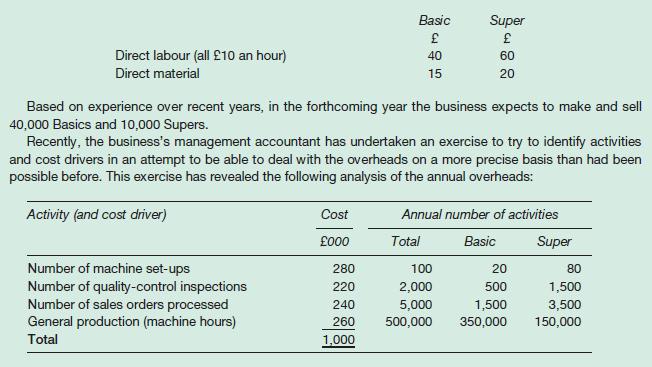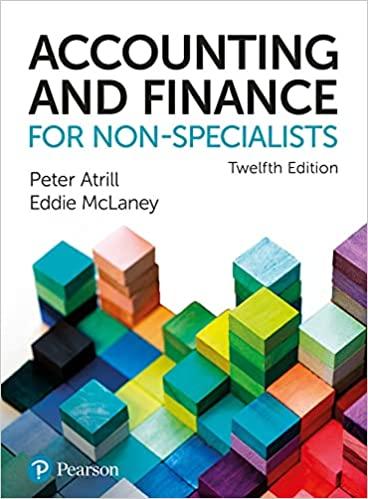Psilis Ltd makes a product in two qualities, called Basic and Super. The business is able to
Question:
Psilis Ltd makes a product in two qualities, called ‘Basic’ and ‘Super’. The business is able to sell these products at a price that gives a standard profit mark-up of 25 per cent of full cost. Full cost is derived using a traditional batch costing approach.
Management is concerned by the lack of profit.
To derive the full cost for each product, overheads are absorbed on the basis of direct labour hours. The costs are as follows:
The total annual overheads are £1,000,000.

The management accountant explained the analysis of the £1,000,000 overheads as follows:
The two products are made in relatively small batches, so that the amount of the finished product held in inventories is negligible. The Supers are made in particularly small batches because the market demand for this product is relatively low. Each time a new batch is produced, the machines have to be reset by skilled staff. Resetting for Basic production occurs about 20 times a year and for Supers about 80 times: about 100 times in total. The cost of employing the machine-setting staff is about £280,000 a year. It is clear that the more set-ups that occur, the higher the total set-up costs; in other words, the number of set-ups is the factor that drives set-up costs.
All production has to be inspected for quality and this costs about £220,000 a year. The higher specifications of the Supers mean that there is more chance that there will be quality problems. Thus, the Supers are inspected in total 1,500 times annually, whereas the Basics only need about 500 inspections. The number of inspections is the factor that drives these costs.
Sales order processing (dealing with customers’ orders, from receiving the original order to dispatching the products) costs about £240,000 a year. Despite the larger amount of Basic production, there are only 1,500 sales orders each year because the Basics are sold to wholesalers in relatively large-sized orders. The Supers are sold mainly direct to the public by mail order, usually in very small-sized orders. It is believed that the number of orders drives the costs of processing orders.
Required:
(a) Deduce the full cost of each of the two products on the basis used at present and, from these, deduce the current selling price.
(b) Deduce the full cost of each product on an ABC basis, taking account of the management accountant’s recent investigations.
(c) What conclusions do you draw? What advice would you offer the management of the business?
Step by Step Answer:

Accounting And Finance For Non Specialists
ISBN: 9781292334691
12th Edition
Authors: Peter Atrill, Eddie McLaney





